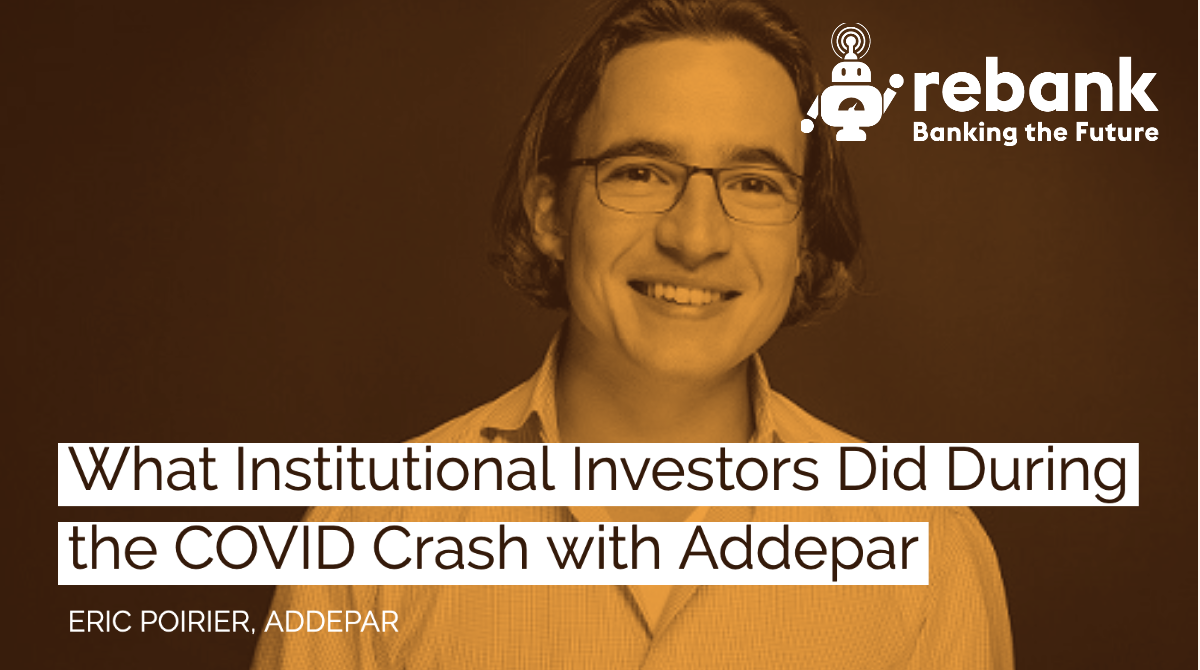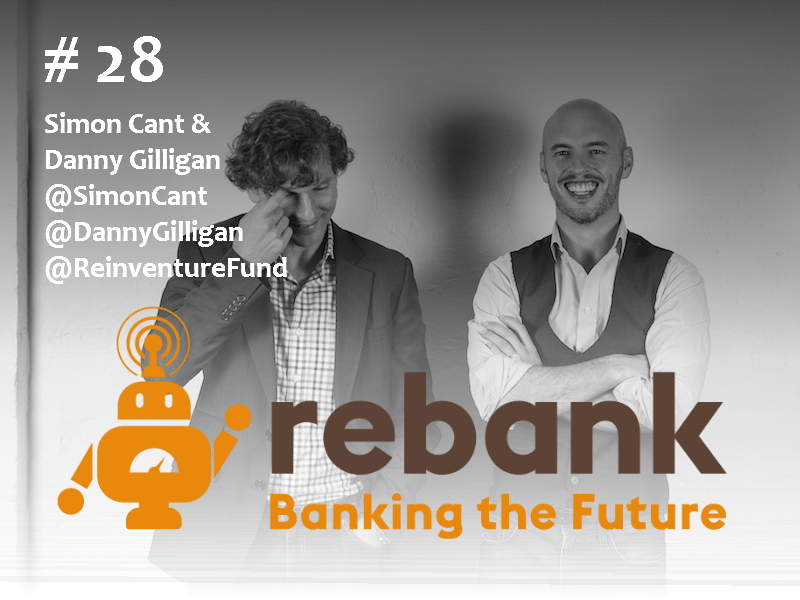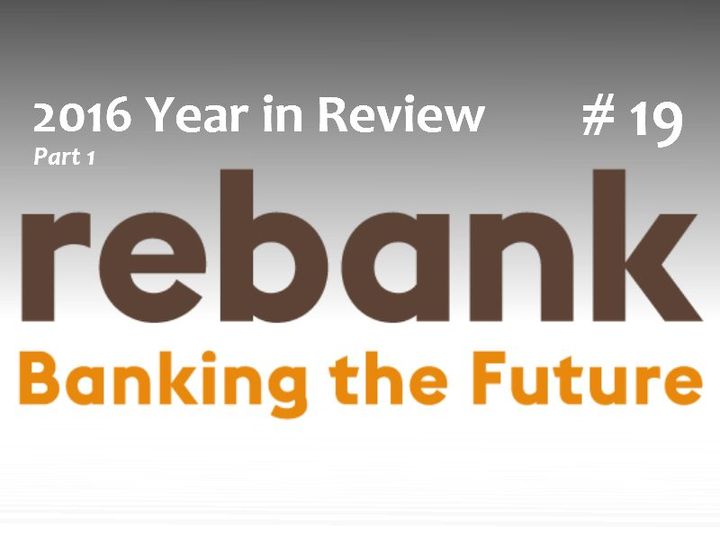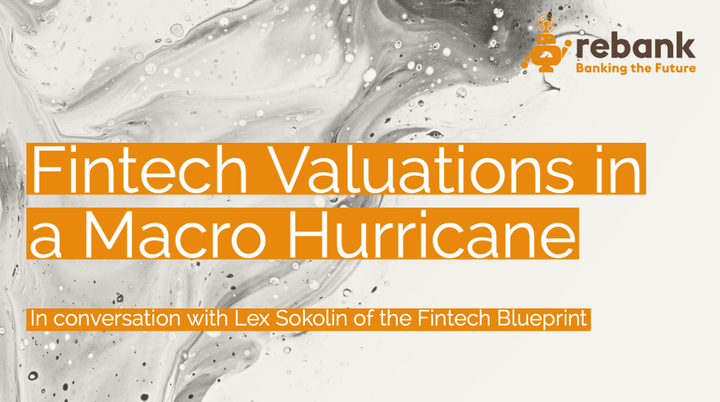What Institutional Investors Did During the COVID Crash with Addepar

Eric Poirier is the CEO of Addepar, a leading investment technology company with a ten-year track record serving institutional clients.
With more than 400 institutional investor clients with approximately $2 trillion in assets on Addepar’s platform, Eric has a fantastic view into how the smart money responded during the COVID crash and where funds are likely to flow during recession and recovery.
Addepar has raised $245 million since inception to build and scale its platform and recently launched primary and secondary market investments in alternative assets to its clients.
Full transcript:
Will Beeson:
Hello, and welcome to Rebank. I'm your host, Will Beeson. Today, we're joined by Eric Poirier. Eric is the CEO of Addepar, a leading investment technology company with a 10-year track record serving institutional clients. With more than 400 institutional investor clients, with approximately $2 trillion in assets on Addepar's platform, Eric has a fantastic view into how the smart money responded during the COVID crash and where funds are likely to flow during recession and recovery. Addepar has raised $245 million since inception to build and scale its platform, and recently launched primary and secondary market investments in alternative assets to its clients. For all of our past episodes, and to sign up to our newsletter, please visit rebank.cc. Thank you very much for joining us today. Please welcome Eric Poirier. Eric Poirier, welcome to Rebank.
Eric Poirier:
Thank you for having me.
Will Beeson:
I've been looking forward to connecting with you. We've been trying to put this together for a little while now, mostly because I was hoping to meet up face to face. I'm interested in the business that you guys run. I think you have a phenomenal story. I'm sorry we weren't able to do that. The whole world has shut down between, I think when we first started talking about this and now. So here we are recording remotely because it made sense to get you on here and get your story out as soon as we could. Maybe just to kick off, you can give me the high level on Addepar and what you guys do, and we can dig in from there.
Eric Poirier:
Yeah. Absolutely. It goes without saying, I look forward to actually meeting in person soon once the world reaches a new normal. Addepar is fundamentally a technology company that we started in late 2009 in the wake of the financial crisis. Since the beginning, the company has been incredibly mission-focused. Joe Lonsdale started the company. He had cofounded Palantir before that. He's a serial entrepreneur.
Eric Poirier:
But the reason for starting Addepar in 2009 immediately following the financial crisis is because we got a pretty deep view in 2007, 2008 in working with hedge funds, private equity funds, large banks, family offices, institutional investors, and so forth about frankly how blind people were flying with their investment portfolios. And this was especially true, somewhat counterintuitively until you kind of think it through for people who are managing larger, more complex portfolios where their holdings aren't just limited to liquid assets like stocks and bonds and ETFs, but they go beyond that and they include alternative investments like private equity and hedge funds and venture, collectibles and all sorts of other stuff.
Eric Poirier:
And so since the beginning, Addepar has been focused on first and foremost, bringing together all the data about our client's portfolios and using technology for that so that we can automate and quality control that to the greatest extent possible by making that data useful, so our clients can ask intuitive questions like how's my portfolio performing and what am I exposed to? What's my portfolio worth? And then they can slice and dice their portfolio really in whatever way they choose.
Eric Poirier:
The net of it is that we've given our clients a really intuitive way to ask whatever questions they want using current data and historical data. And so you can think of that as effectively a rear view mirror. It's a much higher quality rear view mirror than our clients have ever had, but it is kind of more current and backwards looking. And so the company turned 10 this past November, and we just very recently launched where you can compare to windshield and headlights, so our clients are able to take the understanding that Addepar has brought to bear over the last 10 years and use it to much more thoughtfully and in a much more data driven way, make decisions about the future.
Will Beeson:
Fantastic. Look forward to diving into that in a bit more detail, but maybe a couple of follow on questions there before we do that. You talked about solving this problem of basically insight and understanding into existing portfolios. Presumably, we're not talking about the average mom and pop saver with some stock and ETF exposure. We're talking about people with more complex portfolios with less liquid, perhaps less transparent positions.
Eric Poirier:
Yes. Yeah. The way to think about our business and our client base today, we have upwards of 400 firms who we serve, and in aggregate, they have about $2 trillion on Addepar's platform. And so each client has hundreds of billions, billions, maybe tens of billions on the platform, in certain cases 100 billion plus. And you're right, within those portfolios, about 35% of the assets in the portfolios are in alternative investments, liquid assets, and then the remainder, stocks and bonds and cash and things like that. But you're completely right that we're able to uniquely handle the complexity that the high end institutional investors tend to have.
Will Beeson:
Where are we going to take this? The most interesting topic potentially to pick up is around this current economic pinch point that we're living through. I think you mentioned that the motivation for founding the firm initially was to kind of address some of those issues that investors encountered during 2007, '08, '09 around lack of transparency and data availability around positions. Effectively, since you guys started, we've been on one long bull run and that is ending, has ended. What insights are you able to glean from how the platform is performing, the way that the institutions that are using your platform are able to better manage and respond to market changes right now? How is this concept proving itself out now in this kind of moment in which it was created to perform?
Eric Poirier:
Yeah. Excellent question, and one that we can break into a couple of different pieces. I'll just summarize maybe from the outside. I think we're in a really fortunate position having started the company in the wake of a crisis so that we had the mindset going into it that over the course of any 20-year period, there are like 10 days that matter more than all the other days probably combined. And so during those days, that's where our clients really, really depend on us to make sure that the data is in, that the data is right, that they have exactly what they need to have pretty granular conversations with clients to reiterate what the investment strategy had been up until that moment, and to have a very clear, very data-driven very objective conversation to make decisions on, should we change anything right now? Or can we withstand what just happened or what's happening right this moment? Are we still appropriately positioned?
Eric Poirier:
Because as you read about in many, many studies over the years, the biggest mistake people make is when there's a shock to the market and the market's off 5, 10 plus percent, people make emotional decisions, and those emotional decisions end up being unbelievably costly. And so this is one of the moments where financial advisors really are their keep in our interest with their clients. And so we're seeing that play out across our client base. We're seeing higher product usage than we ever have. We're seeing more emphatic client testimonials than I think we have in the history of the company over the course of the last eight weeks. And to be clear, our clients, I think have been quite happy with us as a company for a long time now, but it's really profound how in this moment, our clients are just living in Addepar.
Eric Poirier:
In the first week of that, I would say, is our clients recognizing the benefit of cloud-based software that they can access from everywhere because of course they're accustomed to working in an office and they're accustomed to sitting down with clients. And all of a sudden, without notice, everyone's working from home. They're balancing all sorts of other stuff that's not part of their typical working day. But beyond that, what we're seeing in the data about flows into and out of different asset types questions, more along the investment side of things, we can spend a little bit of time on that too, if you'd like.
Will Beeson:
Absolutely.
Eric Poirier:
If you just look at the portion of our client base that is family offices and RIAs, and you carve off highly concentrated positions where, for example, family owned businesses or businesses where the founder still owns substantial amounts of equity, we'll winnow that down to call it a trillion of the two trillion we have on the platform. Within that trillion, we have call it 80, 85 billion in hedge funds, call it 150 plus billion in private equity and venture. And then we have a bunch of other client assets that are in private companies and other illiquid assets. We've seen a number of different things for people in the market, generally, whether or not they're Addepar clients who need liquidity because they got hit harder than others in the first 35% drawdown. That's resulted in some secondary opportunities, for example, if you have a stub position in a private equity fund that's five years into it cycle, how can you sell it off into the secondary market to free up some liquidity that then you can use to meet the capital call or what have you.
Eric Poirier:
That's a phenomenon that we've seen our clients benefit from that where they're buying secondaries from others in the market. That's one example. We're also seeing some funds are forming right now that are out raising capital. And the strategy of the fund is more to go after the very clearly depressed areas of softness in the market, really just treat those as investment opportunities at much more depressed levels than they have been before. So basically capital formation in to new investment ideas.
Eric Poirier:
We've also seen just given volatility in public markets, especially in March, early April, where markets were moving around five plus percent a day, clients' appetite to really make sure that if they wanted to pull out of public markets, they can either stay on the sidelines and cash and make sure that that cash was well insured, which is one of the relevant bits when we talk, I'm sure later on in this conversation about marketplace, but in addition to that, using it as an opportunity to invest in private companies who are doing really, really innovative things where for the litany of different problems that have just been created in our worlds, those problems need fresh ideas, they need fresh capital, they need fresh resourcing and they need this entrepreneurial spirit that's moving fast to actually solve these problems.
Eric Poirier:
And so having capital flow into fast moving entrepreneurial companies, we're absolutely seeing that, especially being in Silicon Valley where it's so woven into the ethos of how this place works.
Will Beeson:
That's interesting. That's interesting. I didn't get the sense living through 2008 in the investment space, that there was a lot of capital flowing directly into new concepts, new ideas, new ventures. At that time, there was so much uncertainty, turmoil, no sense of how bad it would be and what would happen afterwards. And apart from some very opportunistic expert managers kind of playing public markets, I just didn't get the sense that there was that level of capital flow into new ideas. Whereas now you're saying that there is, which is interesting.
Eric Poirier:
Yeah. I think that point of comparison I think is an important one, and we can ... more than happy to take a few minutes to talk through that. I guess with this global pandemic, we're in unchartered territory, of course. I think one of the things that makes this crisis far different than the global financial crisis is it's affecting each human being, not just of course in our country, but globally in a very visceral way. When you have four plus billion people locked down, that's crazy. The public health aspect to it, of course is devastating. The economic carnage that's the result of that is devastating. But then the monetary and fiscal response, like the FED doing what they've done, it can be somewhat misleading right now, like looking at public markets and looking at the trend of the curve, for example, in New York, where thankfully things are improving from a public health standpoint.
Eric Poirier:
I think I'm seeing a steady flow of ideas of either existing businesses who are treating this as an opportunity for them to add value to the world in a very deep way. And those, it could be the network we're in, but we're seeing a tremendous amount of activity on that. Whereas I think during the global financial crisis, in the grand scheme of things, a small number of large financial firms who had kind of overdone their exposure to mortgages and credit default swaps and all sorts of other structures that were highly leveraged in a ripple through the financial system within very large banks and other large holders of assets in a distinct way. But it was a phenomenon that frankly a lot of people didn't ... they sort of knew it was a big deal seeing markets tanking, all that, but it was distant from their day-to-day lives aside from when they turned on the TV or read the newspaper.
Eric Poirier:
And so I think this one's just like, it's made a meaningful, meaningful impact on each human being's life. And so I think as a result of that, a lot of people are just saying, well, what can we do to create a new normal? Because when we come out of this, it's probably not going to look exactly like it looks two, three, four, five months ago, but how can we make it so we get to a place that's a happy, healthy, brighter place as soon as we possibly can. And how can we put some capital and some resource behind that to get there faster?
Will Beeson:
Yup. I am interested in this point around comparisons and differences with the 2008 financial crisis and what we're living through now. Just kind of riffing on that a little bit, 2008, it was a financial crash that led to the infection of the economy by the financial sector, like credit froze and there was no way for businesses to effectively keep funding themselves. And that kind of led to this domino effect apart from all the kind of cross holdings at banks and the rest. But the economy slowed down because suddenly credit froze, and then all sorts of job losses resulted as businesses died, and it took a long time to recover from that. But the kind of the first shocks were felt in financial markets and the impact on financial markets from a pure stock price standpoint was dramatic.
Will Beeson:
Here, the impact has been more directly almost on the economy and less at least to date on the financial market. Sure. There was a massive pull back in March, but markets have been pretty buoyant since then. In fact, I think many are kind of scratching their heads as to why markets didn't fall farther, haven't fallen farther. Maybe there's a question as to whether there's another shoe to drop at some point. And then sure, people point to US stimulus and other measures that basically in effect favor the financial markets, favor those who own assets almost to the unintentional detriment of those who don't. Those who don't are the ones losing their jobs, those who don't are also the ones who aren't participating in asset growth. It's certainly a naughty issue. I'd be interested in your thoughts on this.
Eric Poirier:
Yeah. I think the rough contours that you walked through, I agree with you, global financial crisis, the origin story there was deep within banks who had highly leveraged positions granted some of those positions. I've worked at Lehman, '03 to '06 in fixed income analytics, and so I had a very interesting front row seat. I left there before the financial crisis, but having spent a lot of time in mortgage backed securities and doing a lot of the modeling around prepayment rates and default rates and so forth in every MSA in the US looking at lending practices, especially on the subprime side, the buildup of collateralized products in the early and mid two thousands in a low rate environment, everything like that, the buildup happened over the course of years.
Eric Poirier:
And then having one shock that hurt quant funds pretty badly. And then several months later, having of course Lehman go bust, and then it became abundantly clear AIG was insuring just a huge amount of the financial world, and then the counterparty risk and contagion, everything like that, of course, led to millions of people to lose their jobs. In this situation, it is completely, completely different. You have the lockdown, which makes it so hotels and airplanes, everything shuts down immediately. Revenue goes down 90 plus percent across the board, and it's very much a consumer-driven economic phenomenon, but the consumers don't really have a choice in the matter because they can't go outside.
Eric Poirier:
And so I think the actions of the FED among others has been incredibly swift in part because they had the tools that they had sort of assembled in 2008 during the financial crisis to dust off. They had some playbooks that they had formed at that point in time that allowed them to act swiftly and in a really, really significant way where they're pouring trillions of dollars into the market, and I think that that's absolutely one of the reasons why after a 35% drawdown in equity markets, they bounce back. I think that that's one of the explanations for it.
Eric Poirier:
But there's still a lot we don't know. We don't know ... There's obviously a lot of pressure, political pressure, political will of balancing out the very, very clear economic hardships that now 30 something million people just lost their job are facing. The people who still have a job, fortunately, are just facing kind of maintaining some semblance of a work life balance. And then the fear that, okay, once we open things back up, there's just going to be another spike that's going to continue, kind of grow exponentially again until we shut things down again. Is that what's going to happen, or we actually are going to be able to open stuff up in a reasonable way that doesn't lead to a spike? That's an unknown right now.
Eric Poirier:
But the point you're making around, are there some sort of unintended side effects where the beneficiaries of this sort of record federal response, is it too tilted towards the financial sector versus the human beings, the tens, hundreds of millions of people in our country who are suffering a lot? I listened to an interview where Trimont spoke to this point and I thought he did a really great job making some very strong arguments where he was arguing very strongly that yes, way, way more dollars need to be going into individual households for people who are just crushed by this. And that's not where disproportionate amount of the money has gone yet.
Eric Poirier:
There's an inevitable trade off where the government, I think is rightfully moving fast and they're moving very aggressively with trillions of dollars flowing into markets, into the checks that have gone to many, many households, but how this plays out over time, I think, my point of view is we haven't yet done enough for the individuals who had already been living, I think pretty close to the edge of their sort of financial wellbeing, and we're just getting crushed by this. I think that there's more we're going to have to do absolutely to make sure that these families, these individuals are okay in the months and frankly in the years to come.
Will Beeson:
This is such rich subject matter given what we're living through. I'm really glad we were able to connect right now. I think it was a perfect time to have this conversation. We didn't even have time to talk about the $40 million that you guys raised, I think what, within the past two months or so, which sounds like a strong confirmation of all the great work you guys are doing.
Eric Poirier:
Feels like years ago at this point.
Will Beeson:
Yeah. I'm sure it does.
Eric Poirier:
I'll just say one word on that. WestCap made an investment in the company. The WestCap team is extraordinary. Lawrence Tosi who has been running that firm for quite some time, and the other partners there were Scott and Jamie and others, they've got to know the company, LT, especially over the course of the last couple of years. And you're right. I mean, of course the investment in Addepar is a clear acknowledgement that with their inside view, it's a great company. We're going to be continuing to innovate for the long run. We're really pleased with it and we're proud of it. I can't believe it was just a couple months ago here.
Will Beeson:
Excellent. Well, look, Eric, great pleasure to connect. I'm very impressed with all the work you guys have done over the past, what, 10 years now. Crazy to think. Very well placed, I think going forward and exciting to hear about all the progress.
Eric Poirier:
I appreciate you having me. I really enjoyed our conversation, and again, look forward to meeting up in New York once that's, I guess, an appropriate and legal thing to do.
Will Beeson:
Likewise, likewise. Eric Poirier, thank you very much for joining us today.
Eric Poirier:
All right. Thanks for having me. Take care and stay safe.


